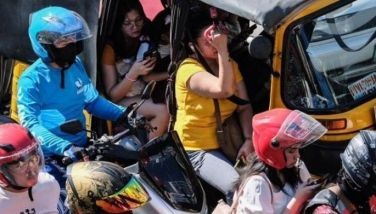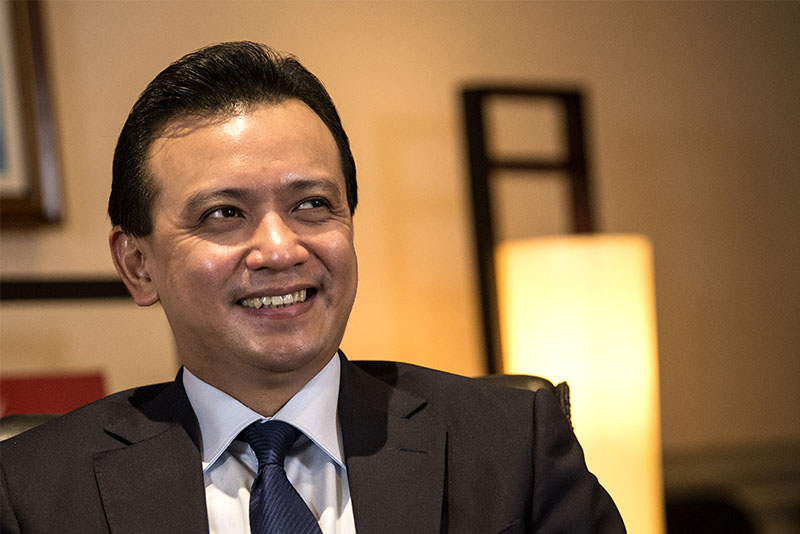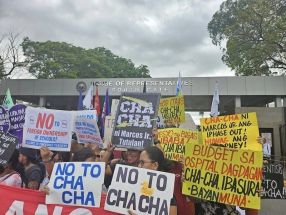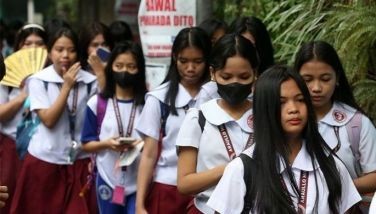Presidential appointee council would usurp court powers under anti-terror bill — HRW
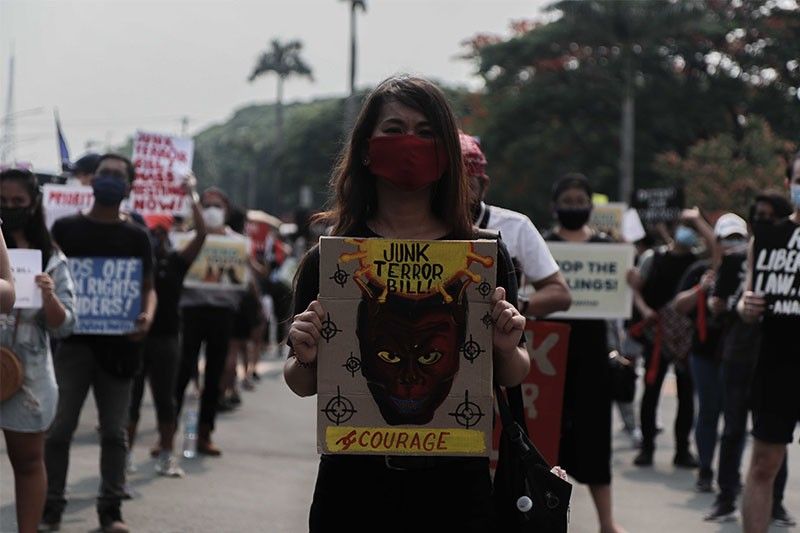
MANILA, Philippines — An international watchdog group today warned against provisions in the controversial anti-terrorism bill which would allow presidential appointees to usurp court powers.
"The draft law creates a new Anti-Terrorism Council (ATC), consisting of members appointed by the executive, that would permit the authorities to arrest people it designates as 'terrorists' without a judicial warrant," Human Rights Watch (HRW) said in a statement.
This new body would be composed mainly of Cabinet officials.
The report also highlighted sweeping definitions of terrorism which could sentence those convicted with up to life in prison without parole. The proposed measure leaves it entirely to the appointed council to determine whether a threat should be considered serious.
"While the definition also includes aims often associated with terrorism, such as seeking to 'seriously destabilize or destroy the fundamental social, economic or political structures of the country, it does not require such intent," the group said.
For example, a provision in the draft law that makes it a criminal offense to “incite others” to commit terrorism “by means of speeches, proclamations, writings, emblems, banners or other representations tending to the same end” is quoted in the report.
HRW warned that this would pose a serious threat to both press freedom and the freedom of expression.
“The Philippine people are about to face an Anti-Terrorism Council that will be prosecutor, judge, jury, and jailer,” HRW Deputy Asia Director Phil Robertson said in a statement.
The group added that the draft law allows terrorism suspects to be held for 24 days before they must be presented before a judicial authority.
Under the existing Human Rights Act, terrorism suspects can only be held for three days before facing a judge. HRW said it believes that detainees should “appear before a judge within 48 hours” of their arrest.
The group added that the proposed anti-terror law also “relaxes accountability for law enforcement agents who violate the rights of suspects, particularly those in detention” as it does away with the P500,000 penalty for every unlawful day of detention.
Inter-agency task forces placed under the Anti-Terrorism Council
The report also drew attention to the existing National Intelligence Coordinating Agency (NICA), the government’s main intelligence body, which would be directly run by the Anti-Terror Council’s secretariat under the draft bill.
HRW said NICA has a history of "carrying out a long-running surveillance, harassment, and suppression [campaigns] against activists and groups that operate openly and legally."
The group referenced a UN Human Rights Office in Geneva report released on June 4 which said "248 activists have been killed between 2015 and 2019 in relation to their work."
HRW added that the military, the police, and their inter-agency forms such as NICA and the National Task Force to End Local Communist Armed Conflict frequently accuse activist groups of "being front organizations, members, or supporters of the New People’s Army, the armed wing of the Communist Party of the Philippines."
DILG claims anti-terror bill will not be used to silence dissent
Interior Secretary Eduardo Año on Wednesday thanked Congress for working on the passage of the controversial bill and claimed it would not be used to silence dissent.
"As government officials, we are used to that. In fact, we welcome them because this is the essence of a democratic government," he said in Filipino in a statement. "There is no provision [to silence dissent] in this bill."
Despite these reassurances, the interior department in April said it would file criminal complaints against activists who had volunteered for a relief mission in Norzagaray, Bulacan, saying they had attempted to hold a mass gathering and hand out propaganda critical of the government.
The department's spokesman also said that same month that a spontaneous protest by residents of Sitio San Roque who were asking for food and aid was part of "a political agenda to agitate and mobilize the people."
The House of Representatives on Wednesday evening approved the proposed “Anti-Terrorism Act of 2020” (House Bill 6875) on its third and final reading. The controversial anti-terrorism bill now only needs President Rodrigo Duterte's signature to become a law.
President Rodrigo Duterte signed the Anti-Terrorism Law on July 3 despite opposition from rights groups and civil society groups that it could be used to stifle human rights.
A petition against the law has been filed at the Supreme Court and other groups are preparing pleadings of their own.
Follow this page for updates. Photo courtesy of The STAR/Michael Varcas
National Security Adviser Hermogenes Esperon moves to block access to several websites, including news sites of alternative news orrganizations Bulatlat.com and Pinoyweekly.org.
In his letter to the National Telecommunications Commission, he only says the websites are "affiliated to and are supporting these terrorists and terrorist organizations."
No other basis to back up his allegation was cited in the letter.
Citing the designation of the CPP-NPA-NDF as terrorists, NSA Hermogenes Esperon moves to block access to several sites.
— Kristine Patag (@kristinepatag) June 22, 2022
In Esperon's letter to the NTC, he included news sites @bulatlat and @pinoyweekly; sites of other progressive groups RMP and Save our Schools. @PhilstarNews pic.twitter.com/nAzMITJFsS
The Commission on Human Rights says it "partly welcomes" the Supreme Court decision that some parts of the controversial Anti-terrorism Law are unconstitutional.
CHR spokesperson Jacqueline de Guia says the commission remains hopeful that the remaining contentious provisions of the law will be clarified by the high cour in the full text of the decision.
"At the same time, our commitment remains in guarding against possible human rights violations arising from the implementation of the anti-terror law. We steadfastly remind the government that countering terrorism and protecting human rights are not competing values but are, in fact, mutual and complementary," De Guia says in a statement.
The Supreme Court has deliberated and voted on the controversial Anti-Terrorism Act but the decision will be released "at the soonest time possible."
"However, considering that there were numerous issues resolved in the case, as well as the fact that each Justice had to vote on each issue, there is a need to accurately confirm and tally the vote of each Justice in order to ensure the correct resolution of the Court per issue," SC spokesperson Brian Hosaka says.
The Anti-Terrorism Council designates the National Democratic Front of the Philippines, the panel that negotiates for communist rebels during peace talks a terrorist organization.
Previous designation of the Communist Party of the Philippines and New People's Army led to the designation of supposed members of the CPP's Central Committee. Among those designated as terorrists were peace consultants.
Designation gives the Anti-Terrorism Council the authority to investigate and freeze the accounts of designated persons.
The Anti-Terrorism Council has designated 29 people, including alleged members of the Communist Party of the Philippines-New People's Army, as terrorists in two resolutions.
Designation allows the Anti-Money Laundering Council to freeze the assets of those on the list.
- Latest
- Trending















